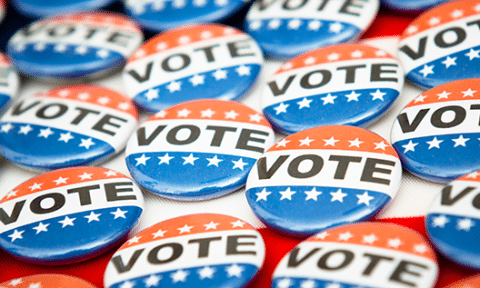Voters Largely Satisfied With Both DeSantis and Whitmer, Despite Stark Policy Differences
COMMENTARY

Florida Gov. Ron DeSantis recently headed to Michigan for a few speaking engagements that informally confirmed his intention to run for president in 2024. The governor of the once-swing-now-red Florida brings a stark contrast to Michigan’s Democratic Gov. Gretchen Whitmer and her newly minted blue trifecta.
On every major issue of the day, Florida and Michigan have taken opposite approaches. One-thousand miles away on the same day in April, Whitmer signed a bill repealing Michigan’s 1931 abortion ban while Florida passed a DeSantis-backed bill that bans abortion after six weeks. In Michigan, Whitmer signed an 11-bill gun control plan while DeSantis recently enacted a law that allows concealed carry without a permit in Florida. Michigan recently made headlines by being the first state to repeal a right-to-work law since 1965 while in Florida DeSantis passed a law that would prohibit public employers from directly deducting union dues, instead making union members arrange dues payments on their own.
It seems that the vastly different approaches are serving both governors well. Recent Morning Consult polling shows that Whitmer and DeSantis have identical approval ratings of 56%, significantly beating President Biden’s 43% rating. Both governors won their 2022 reelections with considerable room to spare and, for whatever it’s worth, both draw the ire of former President Donald Trump.
The similarities of political outcomes for the two states match economic markers. Florida is ranked the fourth-most business friendly state and Michigan the 12th by the Tax Foundation, a relative positioning confirmed by CNBC’s 2022 rankings. The median income in both states is within a few hundred dollars. The total state and local tax burden is 8.6% for Michigan and 9.1% for Florida, ranked fifth and 11th, respectively.
How can two states with such wildly different governors and approaches to public policy end up at approximately the same place? Each state is governed by officials who are ultimately held accountable to meeting the needs and value expectations of their specific population. The structure of American government — that gives states the flexibility to be responsive specifically to its citizens — is how vastly different approaches can lead to the same level of satisfaction.
The majority of Americans agree with this structure. According to a recent State Policy Network State Voices poll, 59% of Americans, a two-to-one-margin, think states should be able to make laws that reflect the different values, priorities and needs of their people instead of having one set of laws for everyone across the nation. Furthermore, State Policy Network’s polling shows that 61% believe state and local politicians, rather than national ones, are more focused on getting things done, indicating people think it’s not just preferable but also more successful.
There is a push from both parties to federalize issues that can and traditionally have been handled at the state level. Moving to a one-size-fits-all approach to governing our vast and diverse nation will only serve to increase political divisiveness and destabilize the country. The ability for each state to be able to set their own laws, and not have to come to a full national consensus on every issue, is a benefit, not a drawback, of the American system of government.
Perhaps on his trip through Michigan, DeSantis won over enough voters in the blue-leaning state to ultimately secure a presidential win. Whether it’s DeSantis or someone else sitting in the White House in January 2025, the president, and the federal government, must continue to respect the state autonomy that leaves Michigan and Florida voters largely satisfied with vastly different policies.
Erin Norman is the Lee Family fellow and the senior messaging strategist at State Policy Network. You can reach State Policy Network on Twitter.
























